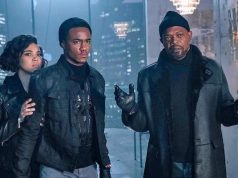Spike Lee’s “25th Hour” is in some ways a thrilling departure for the director, and in other ways a predictable, tired adherence to the quirks that have marked his previous work.
It is only the second time, after “Clockers” (1995), that Lee has directed a fictional film based on a book, and one of only a few times that he has not written the screenplay himself (or at least had a hand in it). The novel, by David Benioff (who did the adaptation, too), is set in New York but otherwise has little in common with the themes and characters that have inhabited most of Lee’s films. Race relations are not an issue here, and nearly all of the characters are white.
Thus, there is a certain curiosity in seeing what a talented director will do when he steps outside of what he has heretofore focused on. “25th Hour” confirms that Lee has a remarkably keen sense of cinematic style, that in many ways he can compete with heavyweights like Scorsese and Spielberg, and that like most great directors, he has a knack for screwing up his own work.
The story is of Monty Brogan (Edward Norton), a drug dealer who has been nabbed by the DEA and has 24 hours before reporting to prison for a seven-year term. Within that day, which he treats as though it were the last day of his life, he must say farewell to friends and endure a massive going-away party at a nightclub where he is a celebrated patron. He is plagued by the possibility that his girlfriend, Naturelle (Rosario Dawson), is the one who turned him in. Monty Brogan is a tortured soul.
His best friends are Jakob (Philip Seymour Hoffman), a depressed schoolteacher, and Francis (Barry Pepper), a hot-shot investment banker. They support Monty, though they privately suspect he’s getting what he deserves; Monty appreciates them, though he secretly wonders if as friends they ought to have done more to prevent him from ruining his life.
“25th Hour” has a startlingly real and palpable sense of gloom about it. Norton’s devastating depiction of Monty’s regret, anger and sadness force us to reflect on what we would do in that situation. He could run, of course, and his father (Brian Cox) even suggests it, though it would mean he could never set foot in New York again lest he be caught.
Norton’s most shining moment as Monty is a lengthy diatribe in a mirror in which he rails against every group in New York: blacks, cops, gays, Asians, Osama bin Laden, everyone, on and on for what seems like several minutes, each slur more passionate than the last. It’s a fantastic scene, reminiscent of similar talk-to-the-camera moments in “Do the Right Thing” (1989), but more inflammatory.
Somewhat less effective is the subplot involving Jakob’s attraction to one of his students, the vixenish Mary (Anna Paquin). Amidst the drama and introspection, this small matter seems lightweight. In the novel, it adds to the idea that this is the long, dark night of everyone’s soul, not just Monty’s; in the film, though, it seems irrelevant.
And then there is the film’s biggest mistake, the one that reminds us most of Lee’s fallibility: The film insists on wedging post-9/11 references into the story. Jakob and Francis have a lengthy conversation in Francis’ apartment, which overlooks Ground Zero. Lee’s audacity for filming at such a location is admirable; indeed, “25th Hour” will go down as the first major film to address and deal with Sept. 11. But it’s as though the hope of earning that footnote-worthy distinction was Lee’s only reason for doing it. The story itself, written in 2000, doesn’t need the 9/11 baggage, and every time it pops up in the film, it stands out like a sore thumb, like something that clearly was never intended to be part of the drama.
It is worth noting that, aside from those insertions, the film is virtually free of Lee’s usual bombast and political activism. The characters actually seem to live and breathe, rather than being made-up figures blasted onto the screen. Frequent Lee collaborators Barry Alexander Brown (editor) and Terence Blanchard (music) contribute as well, with Blanchard’s sweetly melancholic score being particularly useful in the film’s operatic final sequence.
Some do not like the film’s (and the book’s) ambiguous ending, and I disagree with casting Edward Norton, as good as he is, as a character whose main reason for wanting to avoid prison is that he’s “too pretty” to survive there. (Norton is good-looking, but would you ever call him a “pretty boy”?) It is hard to argue against a film as well-acted and sensibly assembled as this one, though. It demonstrates maturity on the part of the director, even if that maturity is tempered with the occasional bursts of vainglorious grandstanding.
B+ (2 hrs., 12 min.; )





